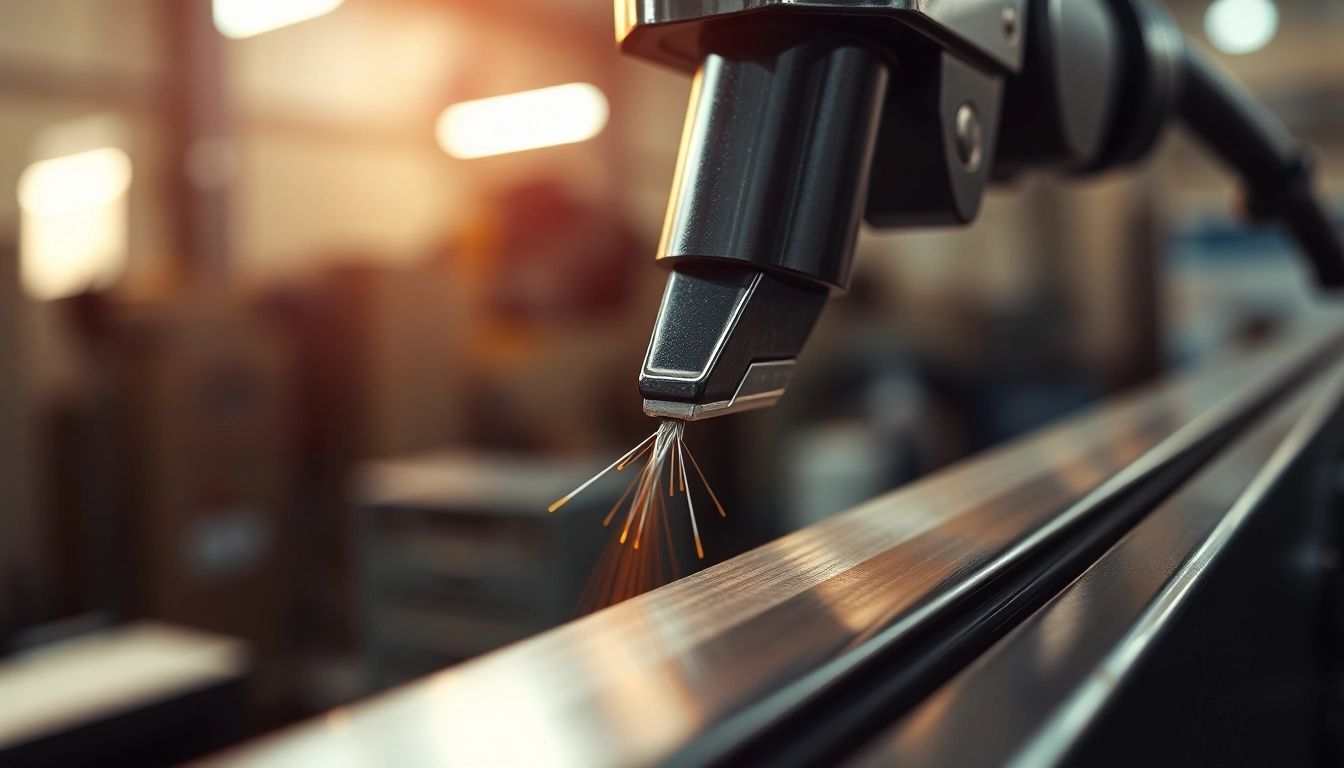
What is a Needle Gun?
Definition and Functionality
A needle gun—sometimes referred to as a needle scaler or needlegun—is a powerful tool designed primarily for surface preparation. It employs multiple high-velocity steel needles that create a rapid hammering action. This action is achieved through pneumatic or electric power mechanisms, enabling the gun to loosen and remove unwanted materials like rust, old paint, and mill scale from various surfaces, particularly metal. The versatility of a needle gun makes it an indispensable tool in industries ranging from automotive repairs to shipbuilding and metalworking.
Advantages of Using Needle Guns
Needle guns come with numerous advantages that enhance efficiency and effectiveness during surface preparation:
- Efficiency: Compared to manual sanding or grinding methods, needle guns can significantly reduce the time it takes to clean a surface.
- Precision: The needles can reach tight spaces and intricate designs, ensuring thorough cleaning without damaging the base material.
- Reduced Operator Fatigue: With their lightweight design and speedy operation, needle guns minimize the physical strain on operators.
- Versatility: They can be used on a variety of surfaces, including steel, aluminum, and more, making them suitable for an array of applications.
Common Applications Across Industries
Needle guns are employed in several industries and applications, including:
- Automotive: Used to remove rust and prepare metal surfaces for painting or welding.
- Shipbuilding: Essential in the maintenance of marine vessels by cleaning hulls of algae, barnacles, and old paint.
- Construction: Useful in preparing metal structures for finishing coats.
- Manufacturing: Widely used in workshops to prepare components for assembly by removing surface contaminants.
Types of Needle Guns Available
Pneumatic vs. Electric Needle Guns
Needle guns typically fall into two main categories: pneumatic and electric. Each has its own set of benefits and limitations. Pneumatic needle guns operate using compressed air and are known for their high power and durability, making them ideal for heavy-duty tasks. They can provide greater impact force but may require an air compressor, increasing their operational costs.
On the other hand, electric needle guns are easier to operate and do not require an air supply, which can make them more convenient for light to medium tasks. However, their performance may not match that of pneumatic models in terms of power and speed.
Choosing the Right Needle Gun for Your Project
Choosing the right needle gun depends on several factors, including the nature of the task, the type of surface being treated, and the volume of work:
- Task Nature: For heavy-duty applications such as shipyard work, a pneumatic needle gun may be more suitable, while lighter tasks can be handled by electric models.
- Surface Type: Consider the material and the condition of the surface. Some needle guns come with interchangeable needle sizes for versatility.
- Volume of Use: For consistent, industrial use, invest in a robust pneumatic needle gun, whereas occasional DIY projects may benefit from a lighter electric model.
Performance Features to Consider
When evaluating needle guns, take note of the following performance features:
- Needle Count: More needles can increase the efficiency of rust removal and speed up the job.
- BPM (Beats Per Minute): Higher BPM indicates a faster operation, crucial for extensive surface preparations.
- Ergonomics: Look for guns that offer a comfortable grip and manageable weight to reduce user fatigue.
- Noise Levels: Consider models that operate quieter, as high noise levels can be disruptive in a working environment.
How to Use a Needle Gun Effectively
Preparation and Safety Precautions
Before operating a needle gun, ensure safety is your top priority:
- Protective Gear: Always wear safety glasses, gloves, and ear protection to protect yourself from debris and noise.
- Work Area: Ensure your work area is clean, organized, and well-ventilated. Remove any obstacles that may cause accidents.
- Tool Inspection: Regularly check the needle gun for any signs of damage or malfunction before each use.
Step-by-Step Guide to Operating a Needle Gun
To operate a needle gun effectively:
- Connect your needle gun to the appropriate power source—either compressed air for pneumatic models or plug in your electric model.
- Select the correct needle size based on your surface and task requirements.
- Position the gun at an angle of about 30 degrees from the surface for optimal efficiency.
- Start the tool and begin moving it across the surface steadily, allowing the needles to do the work.
- Monitor the process, ensuring that the surface is being cleaned evenly without excessive pressure.
Best Practices for Optimal Results
To achieve the best results with your needle gun:
- Maintain a consistent speed and angle while operating the tool.
- Regularly clean the needle tips to ensure they remain in optimal condition.
- Take care to avoid holding the needle gun in one spot for too long to prevent surface damage.
Maintenance Tips for Your Needle Gun
Routine Cleaning Procedures
Proper maintenance is crucial to extending the life of your needle gun:
- After each use, disconnect the tool from its power source and clean off any debris or dust accumulation.
- Inspect the needles for wear and replace them if they show significant signs of bluntness.
- Lubricate moving parts according to the manufacturer’s recommendations to ensure smooth operation.
Troubleshooting Common Issues
If you encounter problems with your needle gun, consider the following solutions:
- Tool Not Starting: Check the power source or compressed air supply to ensure it is functioning properly.
- Low Power Output: Inspect for clogged needles or filters, and clean them if necessary.
- Excessive Vibration: Ensure that the needles are properly installed and not worn out.
Extending the Life of Your Tool
To maximize the lifespan of your needle gun:
- Store the tool in a dry place, away from moisture, to prevent rust.
- Only use the equipment as recommended by the manufacturer to avoid unnecessary strain.
- Schedule regular maintenance and service checks for ideal functionality.
Buying Guide: Where to Purchase a Needle Gun
Top Brands and Models
Several brands are renowned for their high-quality needle guns:
- Ingersoll Rand: Offers a range of pneumatic models known for durability and effectiveness.
- Snap-on: Renowned for high-performance electric needle scalers that are lightweight and easy to handle.
- Harbor Freight: Provides affordable options for hobbyists and DIYers, making them ideal for light tasks.
Comparing Prices and Features Online
When shopping for a needle gun, take time to compare models online:
- Read user reviews and ratings to gauge satisfaction and performance.
- Compare prices across multiple retailers to find the best deals without compromising quality.
- Take note of specifications to ensure the model meets your specific needs.
Understanding Warranties and Returns
Before purchasing, consider the following regarding warranties:
- Verify what the warranty covers: repair, replacement, and labor.
- Understand the duration of the warranty, typically ranging from one to three years.
- Review the return policy of the vendor in case the product does not meet expectations.





